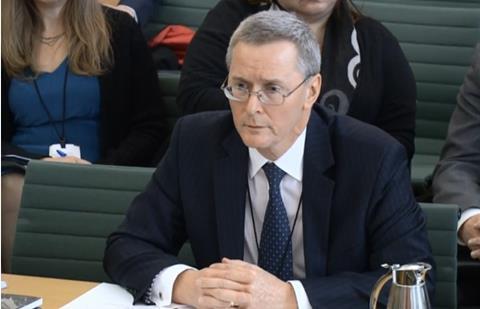Richard Adam caused firm to “rely on false and misleading financial information” for its 2015 and 2016 financial statements, says Insolvency Service
Another former Carillion finance chief has been disqualified as a director.
Richard Adam, who was group finance director for the doomed contractor between 2007 and 2016, has been given a 12-and-a-half-year ban by the Insolvency Service.

It follows a similar ban for Zafar Khan, who was Carillion’s finance chief for nine months until he was fired shortly before the contractor’s collapse in 2018.
According to a statement from the Insolvency Service, acting on behalf of the secretary of state for business and trade, Adam caused Carillion to “rely on false and misleading financial information” for its 2015 and 2016 financial statements.
This included the reporting of revenue and costs on the performance of major jobs, namely Royal Liverpool University Hospital, Battersea Power Station, Aberdeen Western Peripheral Route, Midlands Metropolitan Hospital and Msheireb Phase 1(B).
According to the service, the financial statements “concealed the reality of the deterioration of the major contracts which in fact became loss-making and Carillion’s consequent grave and deteriorating financial position”.
The value of the misstatement for the financial statements, in respect of these major contracts, was £95.4m in 2015 and £179.2m in 2016.
Carillion had been the UK’s second biggest contractor and was working on 420 public sector contracts when it went bust in January 2018.
Adam, along with ex-chief executive Richard Howson and chairman Philip Green bore the brunt of criticism in the 100-page report published by a public inquiry following the firm’s collapse.
Its findings labelled Adam as the “dominant personality in Carillion’s finance department” who was the “architect of Carillion’s aggressive accounting policies [who] resolutely refused to make adequate contributions to the company’s pensions schemes”.
The report said his departure in 2016 was “perfectly timed” and that he had sold his shares in the company for £776,000 “just before the wheels began very publicly coming off and their value plummeted”.
At the time, Adam rejected the findings, saying the reasons for the collapse were “clearly complex”.
“I have objected to the committees about quotes that they have misattributed to me,” he said.
“I look forward to contributing to the due process and conclusion of the various investigations that are still ongoing.”




























No comments yet